Medium- to Long-term Environmental Targets
In fiscal 2018, we established a medium- to long-term environmental plan ending in fiscal 2030, and have been engaged in activities based on it. Following the government's 2050 Carbon Neutral Declaration and presentation of its 2030 target, however, we performed a revision, and reset our 2030 target policy to include a 46% or more reduction in CO2 emissions (compared to fiscal 2013). In doing so, we re-set the base year to fiscal 2013 and set targets based on the following factors as well.
- The CO2 emissions coefficient for domestic electricity was changed from basic to adjusted. *1
- Response to sustainable development needs with 2030 as the target year established in the SDGs.
- Response to Act on the Rational Use of Energy/Promotion of Global Warming Countermeasures.
The targets were defined upon considering the impact of the difference between the base year of fiscal 2013 and the current scope of coverage, which includes the Vaupell Group having become subject to environmental management from fiscal 2015, and the SB Kawasumi Group from fiscal 2021. (The effects of the differences in coverage of the SB Kawasumi Group, the Vaupell Group, etc., have been added to the base year graph.)
In Japan, the target for 2030 is well above 46% due to switching purchased electricity to electricity derived from renewable energy sources at all major business sites from January 2021.
Given future efforts to go carbon neutral at overseas sites as well, the Group's overall target will also greatly exceed 46%. We also continue to work with the Japan Business Federation (Keidanren) on its “Society 5.0 with Carbon Neutral” commitment through the Japan Chemical Industry Association.
Other targets were also revised to unify the base year as fiscal 2013, taking into account the impact of the SB Kawasumi Group. We will continue to improve the resource utilization rate by curbing the amount of material loss (waste and valuable resources), promote effective use of raw materials, and also promote reduction of chemical substance emissions in order to systematically reduce our environmental impact.
- *1 According to adjusted emissions coefficients for each electric utility published by the Ministry of the Environment and the Ministry of Economy, Trade and Industry. To accommodate menu-specific emission factors from the introduction of electricity from renewable energy sources, recalculations were made retroactively back to fiscal 2013.
Initiatives at Business Sites in Japan
The amount of production as well as energy consumption decreased in fiscal 2022.
The switch to electricity derived from renewable energy sources at all major business sites in the fourth quarter of fiscal 2021 and the aggressive introduction of solar power generation had an effect on CO2 emissions, which have decreased significantly compared to the previous year. Further efforts will be made to reduce CO2 emissions from fiscal 2023 and beyond by sites still using heavy oil by switching to gas power generation, as well as studying ways to switch to renewable energy sources.
The amount of material loss decreased in line with the decrease in production volume. MFCA activities will also be conducted through fiscal 2023 at each business site to identify losses and promote reduction measures, to make more effective use of resources and eliminate wasteful inefficiency.
The temporary increase in chemical substance emissions caused by a breakdown of exhaust treatment equipment at some of our business sites was resolved, and emissions for fiscal 2022 remained mostly the same as the previous fiscal year. Yet some business sites have reduced the amount of organic solvents used by changing production methods, so we expect emissions to decrease for fiscal 2023.
- *2 See the glossary.
Initiatives at Overseas Business Sites
CO2 emissions at overseas business sites decreased together with the drop in production volume, with sites in North America and China switching to electricity derived from renewable energy sources, as well as solar power generation installed at five business sites mainly located in China and Asia contributing to the reduction inCO2 emissions. In fiscal 2023, further reductions are anticipated due to the increase in sites switching to electricity derived from renewable energy sources and introducing solar power generation.
The amount of material loss also decreased in line with the drop in production volume, but MFCA activities similar to those conducted at sites in Japan helped to reduce waste, with the goal of decreasing losses compared to the previous year.
There was an increase in chemical substance emissions at certain business sites due to the effects of production type mix, but policies will continue to be implemented with a view to reducing emissions over the medium to long term.
Initiatives at Business Sites in Japan
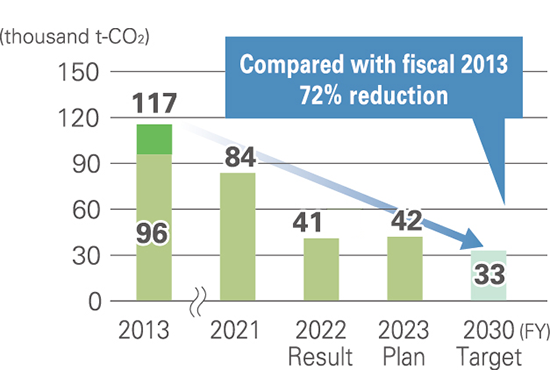
|
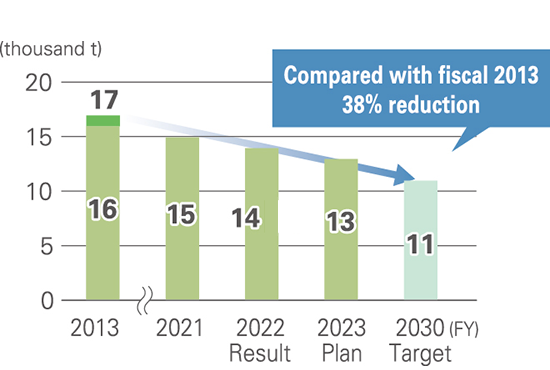
|
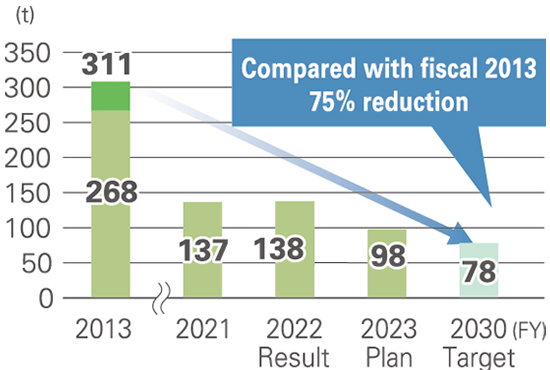
|
Initiatives at Overseas Business Sites
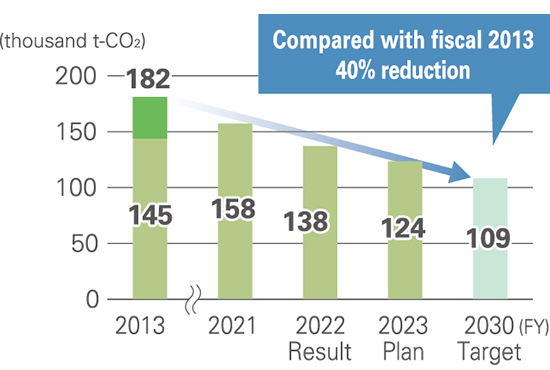
|
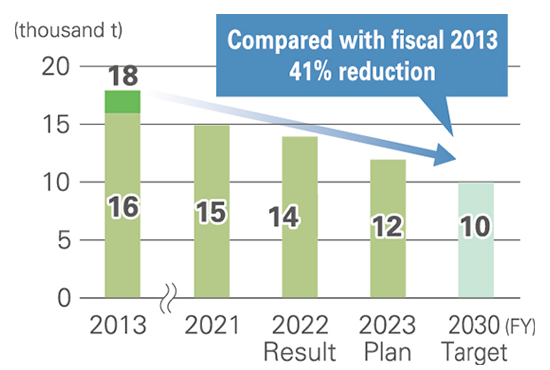
|
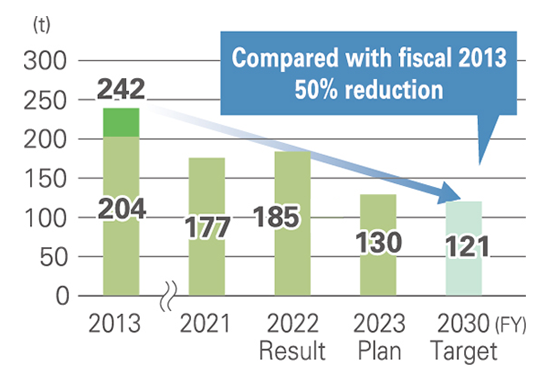
|
- Additional data for SB Kawasumi Laboratories and Vaupell SB Kawasumi Laboratories and Vaupell were included in the data tabulation after fiscal 2013. Their data have been added to the base year (fiscal 2013) data for comparison with actual results.
- * See the organizations listed on "Editorial Policy" regarding those included in the data.
- * For definitions and the calculation method of CO2 emissions, material loss, and chemical substance emissions, refer to "Detailed Data Related to Sustainability".
- * Total emissions of the 31 chemical substances subject to the PRTR Act at our group's domestic business sites amounted to 7.0 tons, and the total amount transferred was 86 tons. For details of the transfer and release of substances subject to the PRTR Act, refer to "Transfer and Release of Substances Subject to the PRTR Act (Fiscal 2022 Performance)".
Topics More
- 2024/02/01 Sustainability Sumitomo Bakelite Co., Ltd. announces its establishment of “Human Rights Policy for the Group of Sumitomo Bakelite Co., Ltd.”
- 2023/10/31 Sustainability Integrated Report 2023 of Sumitomo Bakelite Co., Ltd. has been issued.
- 2023/06/21 Sustainability Selected as an iSTOXX® MUTB Japan Platinum Carrier 150 Index
- 2022/10/31 Sustainability Integrated Report 2022 of Sumitomo Bakelite Co., Ltd. has been issued.
- 2022/10/14 Sustainability Sumitomo Bakelite Co., Ltd. Receives Gold Medal in EcoVadis Sustainability Assessment
- 2022/05/27 Sustainability Participation in the 30by30 Alliance for Biodiversity

 Inquiry
Inquiry